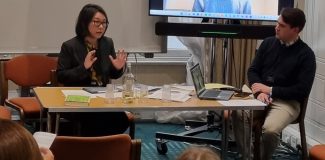Warwick Law School News
Warwick Law School News
The latest updates from our department
WLS academics present reforms to UK Parliament to deal with sovereign debt crisis
 We are pleased to share that Dr Stephen Connelly and Professor Celine Tan from Warwick Law School have published proposals for UK legislative reform to support global efforts to resolve sovereign debt crises in developing countries. These proposals garnered significant attention during a roundtable chaired and attended by Members of Parliament, lawmakers and advisors from New York, sovereign debt scholars and civil society representatives from around the globe. The roundtable unanimously agreed to advance a draft bill of Connelly and Tan’s proposals this coming spring.
We are pleased to share that Dr Stephen Connelly and Professor Celine Tan from Warwick Law School have published proposals for UK legislative reform to support global efforts to resolve sovereign debt crises in developing countries. These proposals garnered significant attention during a roundtable chaired and attended by Members of Parliament, lawmakers and advisors from New York, sovereign debt scholars and civil society representatives from around the globe. The roundtable unanimously agreed to advance a draft bill of Connelly and Tan’s proposals this coming spring.
Background
Most low-income countries (LICs) are either at high risk of or are already experiencing, debt distress. Additionally, many developing and emerging economies (DEEs) are servicing high levels of debt which impacts on other public expenditures, including health and education. This current debt crisis has been exacerbated by deficiencies in the legal framework and governing regime for sovereign financing and the shortcomings in the international architecture of public finance. Recent shifts in sovereign debt markets which have seen diversification of the creditor base for DEEs have made it more challenging for countries to restructure their debts through traditional frameworks and multilateral debt coordination initiatives, such as the G20 Common Framework for Debt Treatments (Common Framework).
In their new briefing paper, co-authored with Dr Karina Patricio Ferreira Lima from the School of Law, University of Leeds, Dr Connelly and Professor Tan address the challenges of securing private creditor participation in sovereign debt restructurings. They highlight the absence of a mechanism to compel private sector creditors - including bondholders as well as banks and other financial institutions – to engage in multilateral debt relief initiatives, resulting in compounded sovereign debt distress and messy and disorderly debt restructuring processes.
Given that up to 90% of debt owed by developing countries to private creditors is governed by English law, the UK is well-placed to address the sovereign debt crisis in those countries through domestic legal responses.
The Authors' Proposal
 The first proposal is to enact legislation based on the Debt Relief (Developing Countries) Act 2010, extending it to debt treatments under the Common Framework and other debt relief initiatives limiting the recoverable debt to the level due to a creditor had it participated in multilateral initiatives. It also supports liquidity-focused initiatives by freezing demands for interest payments made in English courts where multilateral initiatives have agreed on a debt service suspension.
The first proposal is to enact legislation based on the Debt Relief (Developing Countries) Act 2010, extending it to debt treatments under the Common Framework and other debt relief initiatives limiting the recoverable debt to the level due to a creditor had it participated in multilateral initiatives. It also supports liquidity-focused initiatives by freezing demands for interest payments made in English courts where multilateral initiatives have agreed on a debt service suspension.
The second proposal is to extend a form of a scheme of arrangement under the Companies Act 2006 to sovereigns to allow indebted states to apply for a partial or full restructuring of their debts governed by English law under the supervision of an English court, in the same way as local and foreign companies.
These two proposals aim to complement ongoing efforts to develop market-based and contractual approaches to managing sovereign debt crises in DEEs, such as majority voting provisions (MVPs) in syndicated loans and climate resilient debt clauses (CRDCs) in bilateral loans. The authors argue that these proposals ‘are designed to encourage a more effective negotiation process among creditors and to establish a more coordinated and equitable approach to debt restructuring processes, contributing to global efforts to resolve sovereign debt crises’.
Dr Connelly and Professor Tan commented:
“We have been working together with Dr Patricio Ferreira Lima since 2020 on the legislative solutions that the UK Parliament could adopt to contribute towards ensuring private creditor involvement in sovereign debt restructuring, particularly of low-income countries.
We believe that the UK government can play a significant role in dealing with the sovereign debt crisis in low-income countries that are currently exacerbated by intersecting food, energy and climate-related crises that are impacting on social and economic development across the developing world. We believe that the UK government should consult on the various legislative proposals to incentivise private creditors to participate in coordinated debt restructuring processes to further coordinated global action to resolve this crisis.”
Find out more
Read more about the authors’ work here.
